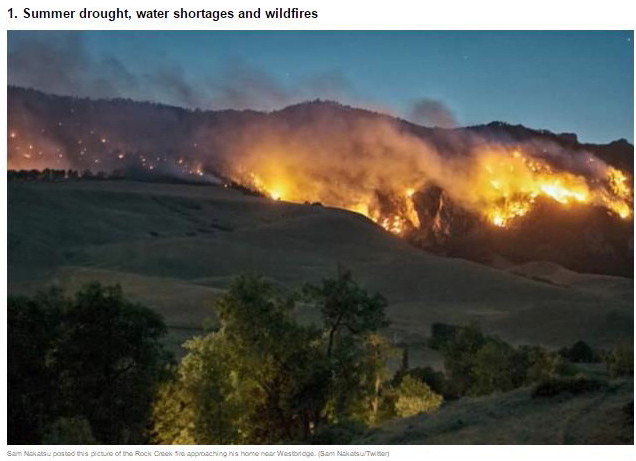CBC POLL: 2015 Drought is British Columbia’s “Top Story of the Year”

Dan Burritt of CBC News interviews Kim Stephens, Partnership for Water Sustainability in BC (Click on image or follow this link: https://waterbucket.ca/wp-content/uploads/2015/12/2015-12-23-KimStephensCBCnosubtitles.mp4)
Voted #1 – Summer drought, water shortages and wildfires
This past summer was one of the driest in recent years.
It started early — with May being the driest on record — and by late July Metro Vancouver had moved to Stage 3 water restrictions.
Meanwhile, parts of Vancouver Island and the Sunshine Coast Regional District declared Stage 4 restrictions, the toughest water restrictions in B.C.
The tinder-dry conditions also caused massive wildfires, including the Rock Creek Fire, which forced more than a hundred people to evacuate their homes.
At the peak of the season, there were roughly 250 wildfires burning across the province, and the government spent $287 million fighting forest fires.
Will 2015 be THE “teachable year”?
“The ‘new normal’ in British Columbia is drought and flooding. The summer dry season has extended on both ends and communities can no longer count on a predictable snowpack and reliable rain to maintain a healthy water balance in their watersheds. This is putting water supply systems and  ecosystems under extreme stress,” says Kim Stephens, Executive Director, Partnership for Water Sustainability in BC.
ecosystems under extreme stress,” says Kim Stephens, Executive Director, Partnership for Water Sustainability in BC.
“The 1987 drought ended a benign period of about 50 years. But it was 2003 that was THE teachable year because we had everything – drought, forest fires, flood, wind and pine beetle. But the average person forgets pretty quickly.”
“2015 is our next big teachable year. But will it replace 2003 as THE teachable year? The drought this year and the windstorms that followed have created a window of opportunity. If communities seize the moment, we will change how we do business over the next few years, and the cumulative benefits will ripple through time,” concludes Kim Stephens.
To Learn More, Click On:
B.C.’s Top Story of 2015 revealed (or click on the image below):



